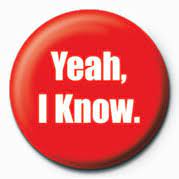As an instructor, I hear I know all the time, and most people say this without really understanding what it is they’re saying or why. I usually hear it from kids, but it also happens sometimes with adults; either way, it’s usually a response meant to appease me or another instructor when a correction is offered. But I know, while it can suggest independence and confidence, actually works to deflect and shut down our capacity to learn. Here are some effects to keep in mind, and reasons to rethink your response to a teacher’s suggestions for improvements.
adults; either way, it’s usually a response meant to appease me or another instructor when a correction is offered. But I know, while it can suggest independence and confidence, actually works to deflect and shut down our capacity to learn. Here are some effects to keep in mind, and reasons to rethink your response to a teacher’s suggestions for improvements.
- When we’re on a path of improvement—martial arts, academic, athletic, musical, or another area—knowing is a relative term. If you truly know something, if you truly understand it, you wouldn’t have anywhere left to improve. When you say I know, it suggests you didn’t need the technique correction. Try instead for okay or thanks or even I will do better. These options communicate, to the instructors and to yourself, that you’re in a state of mind to learn and realize you have room to do better. Choosing I know mentally inhibits your own potential for growth.
- This true understanding—of anything—is very difficult to achieve. Your understanding might exceed your classmates’ due to your experience or knowledge, and you might even appear to them to know it all when, in fact, you’re just further down the path than they are. Saying I know in this circumstance suggests to those fellow learners that you don’t see that there is more path to follow; it models a deflection rather than an acceptance of the need for more learning and practice.
- A student’s job is to learn as best they can within their current conditions. These conditions will shift as each student gets more practice and become more knowledgeable and more capable. But remaining humble and realizing that they don’t know helps them recognize how their state is changing, and that their knowledge is always contextual and relative.
- A teacher’s job is to help others learn what they already have, so it’s really not very different from any other student’s job. Teachers need to remember that they were once in the student’s position: lacking knowledge, experience, and capability but ready to learn. A good teacher also has the ability to teach in different ways for different people, while recognizing each student’s particular state and conditions of learning. Some students might be visual learners who can learn by watching a technique, some also need to hear a verbal explanation, and still others learn best by attempting the technique. The teacher’s job is to meet each student where they are and teach them effectively—so humility, respect, and a willingness to learn are as necessary for teachers as for students.
- I know and the attitudes that drive this reflexive response also influence our thinking about skill retention. I know feels permanent: once we’ve learned something, we should be able to recall and perform it at any point in the future. But this is false since all skills are perishable to some extent. A student with three years of martial arts experience that tries to perform a technique after a two-year hiatus will likely fail, potentially with disastrous consequences. A student with twenty years of training who must perform after a two-year hiatus might be able to do so, since the much longer period of training and improvement has helped ingrain the technique more deeply into their bodies. Physical skills are especially perishable and need to be practiced and practiced, and then practiced some more. Getting into the habit of thinking and saying I know encourages a refocus on new skills rather than continuing to practice old ones as you get further down the learning path.
If you want to continue using your skills at the level you’ve trained for, you have to work on thinking of yourself as a permanent learner that doesn’t ever really know all that there is to know. Stop saying I know and start saying thanks: this will help you remember that we’re all learning and teaching together and we all deserve to show and be shown respect and understanding.





